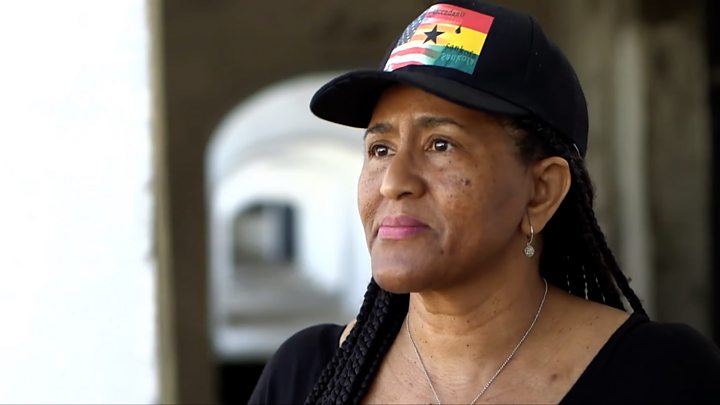Image copyright
Getty Images
Ludacris has won three Grammy awards
African-American rapper and actor Ludacris has become the latest US celebrity to take the nationality of an African country.
Ludacris, whose real name is Christopher Brian Bridges, celebrated Christmas and rang in the New Year in Gabon, where he received the citizenship.
The rapper’s wife Eudoxie Mbouguiengue is Gabonese.
A video uploaded on Twitter shows Ludacris with his Gabonese passport and confirming his mother and two daughters also obtained the citizenship of the small, oil-rich Central African nation.
In recent years a number African-American celebrities have received African citizenship or travelled to Africa to trace their roots.
In August 2019, actor and producer Samuel L Jackson also received a Gabonese passport after he was hosted by Ali Bongo, the president of Gabon. His father, Omar Bongo, was in power for more than four decades.
Gabon is not the only country welcoming African-Americans as citizens.
In May 2019, comedian and actress Tiffany Haddish travelled to Eritrea where she gained the country’s citizenship.
She was criticised by some for appearing to endorse Eritrea’s totalitarian government.
And last November, Ghana held a mass ceremony in which 126 African-Americans and Afro-Caribbeans took Ghanaian nationality as part of the country’s “Year of Return” marking 400 years since the arrival of the first enslaved Africans in North America.
‘Africa was born in me’
The popularity of African Ancestry, a US-based genealogy company with the largest African DNA database, shows that many African-Americans are looking to discover more about their roots and family history.
The Trans-Atlantic slave trade, which saw some 12.5 million Africans shipped to the New World, stripped most African slaves of their identity and over the course of 400 years, erased their history.
“Our ancestors never gave up Faith. You can never imprison our minds nor our spirits. They empowered me to Return,” Ludacris wrote on Instagram.
In one of the photos taken in front of a slave dungeon built by the Europeans in Cape Coast, Ghana, Ludacris has his back turned to the camera, wearing a shirt that says: ” I am not an African because I was born in Africa. I am an African because Africa was born in me. I have returned.”
This is a slogan from Ghana’s “Year of Return” programme.
Returning ‘home’
Samuel L Jackson chose to take Gabonese nationality after taking a DNA test as part of a US documentary series Finding Your Roots that uncovers the family history of stars.
This traced his roots back to the Benga people in Gabon.
Image copyright
Getty Images
Samuel L Jackson visited Gabon in August 2019
The US veteran actor posted several photos of the country, including one with a king of the Benga people.
“When you’re on a journey of discovery & a life choice becomes clear!” he wrote.
The government of Ghana launched “The Year of Return” to encourage African-Americans and the black Diaspora to return “home”.
“The arrival of enslaved Africans [in North America] marked a sordid and sad period, when our kith and kin were forcefully taken away from Africa into years of deprivation, humiliation and torture,” the initiative’s official website says.
It celebrates “the cumulative resilience” of the African victims of the slave trade who were “scattered and displaced” across most continents.
‘Restoring our pride’
A number of black stars saw in the New Year in Ghana. Supermodel Naomi Campbell, actress Lupita Nyong’o, musician Akon and pop icon Beyonce’s mother Tina Knowles Lawson were among some of the bigger stars to attend the Afrofest celebration.
At the mass citizenship ceremony in November, African-American rabbi Kohain Halev summed what it meant to take up the nationality of an African country.
“The most valuable possession that was taken away from us was our identity and our connection; it was like severing the umbilical cord.”
He added that receiving a Ghanaian citizenship had mended the hurt: “Our identity, the dignity, the pride that has been absent is restored here.”

Media playback is unsupported on your device
Many African-Americans don’t feel like they fully belong in the US, according to Dwayne Wong, an author specialising in African and African Diaspora history.
Mr Wong believes that centuries of discrimination and being treated as “second-class citizens”, and the fight for acceptance and recognition that continues to this day in the form of movements like “Black Lives Matter”, has taught African-Americans that they are not fully American.
For some, gaining citizenship of an African country or tracing roots to specific ethnic groups in Africa, can bring an important sense of belonging.
